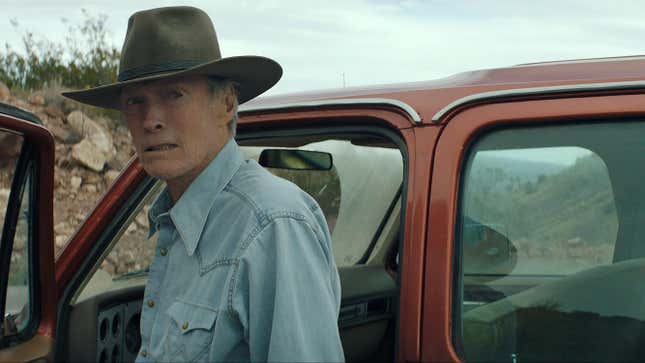
The Macho in the title of Clint Eastwood’s latest, Cry Macho, refers to the name of a prize fighting rooster owned by a 13-year-old Mexican boy, as well as the machismo the rooster represents. It’s 1980, and the boy, Rafa (Eduardo Minett), is traveling north to meet the American father he barely knows at the border, accompanied by an elderly Texas cowboy, Mike (Eastwood), who’s carrying out what’s technically a kidnapping as a favor to the dad. The rooster is along for the ride, much to Mike’s annoyance. The symbolism is that of the passage to manhood and its attendant false idols, though as with Eastwood’s last starring vehicle, The Mule, there’s less journeying here than stopping and detouring.
To an Eastwood fan, much of Cry Macho will feel like a minor-key variation on familiar motifs, with the sentiment laid on thick. Though he is forever enshrined as Harry Callahan and the Man With No Name, the actor-director has at this point spent decades deconstructing the iconography that made him a star, making movies that tell us, in one way or another, that heroism is momentary while regret tends to be a lifelong affair, and that those who hide behind toughened exteriors end up looking back on emptiness.
Here, at the age of 91, almost 30 years since he parted ways with the Western genre in Unforgiven, he once again dons the wide-brimmed hat, and even briefly saddles up a horse (though it’s definitely a stunt double that’s doing the riding). Stooped, shaky, and no longer so tall, he is nonetheless a familiar Eastwood figure, afflicted with could-have-beens. Long ago he lost his rodeo stardom to a broken back and his family to a car accident; more recently, he’s lost his job as a horse trainer to booze and old age. The man who fired him is Rafa’s dad, Howard (Dwight Yoakam), who claims that unspecified “legal issues” prevent him from setting foot in Mexico. As we soon learn, Mike is actually the third man he’s sent to retrieve the boy.
The plot, however, is purely secondary, with the stakes a distant third; the emphasis is on what might be called the vibes. If Eastwood has anything to say about the cowboy archetype, it’s that he can still be a role model, provided we accept his imperfections. Driving the moody, delinquent Rafa from Mexico City to the border, Mike teaches mostly by example. From him, we learn that a cowboy must cook (“Cowboys always cook—it’s kind of our deal”), love animals, value the open air, and know how to fix a jukebox.

One has to wonder if Eastwood, through Mike, is addressing the younger audience that probably won’t see the film, the older audience that will, or his own status as a living cultural memory. The bond between Mike and Rafa is never remotely convincing (Eastwood’s style remains merciless to young and inexperienced actors), but it’s hard not to be moved by the sight of this wizened old man choking up and crying under the deep shadow of his hat brim.
Eventually, the cowboy and the kid find themselves lying low in a pleasant little village, where Mike catches the eye of Marta (Natalia Traven), a widow who runs a local restaurant, leading to scattered sweet moments as well as agonizing longueurs. As with Eastwood’s other late works, one has to expect bum notes, a certain crankiness and creakiness, awkward pacing, and stereotypes in the minor roles. Some peculiarities of The Mule have carried over—namely Eastwood’s predilection for driving montages and his insistence on portraying his character as irresistible to assorted younger women. Whether or not a viewer finds these charming probably depends on how invested they are in interpreting Cry Macho as an Eastwood text.
The fact is that, as a movie, Cry Macho is slow and sometimes dull. But as a statement by Hollywood’s oldest leading man and working director, it offers its share of gleaming low-key insights. As in The Mule (to which it really is a companion piece), Eastwood is out to remind us that a lot of life just consists of going to bed and eating different kinds of sandwiches; one better get used to it, and try to enjoy it. Just in case we don’t get the message, he rasps it out at the end: “This macho thing is overrated.”